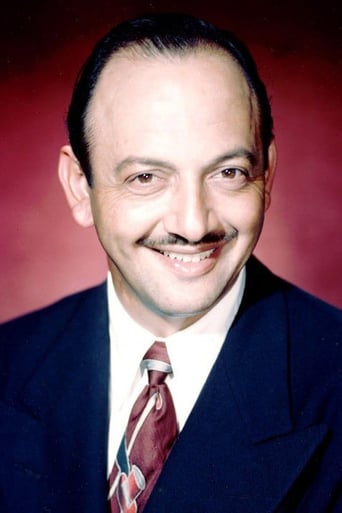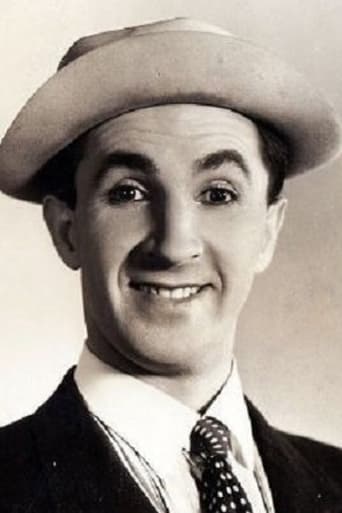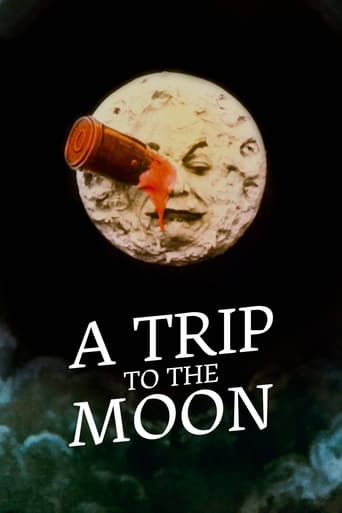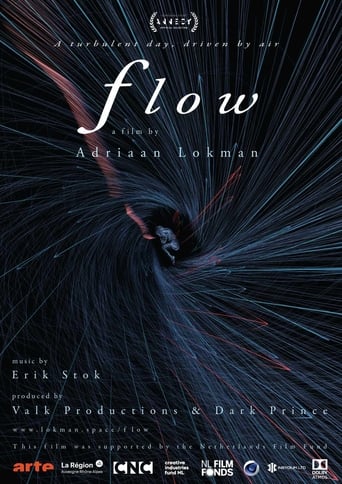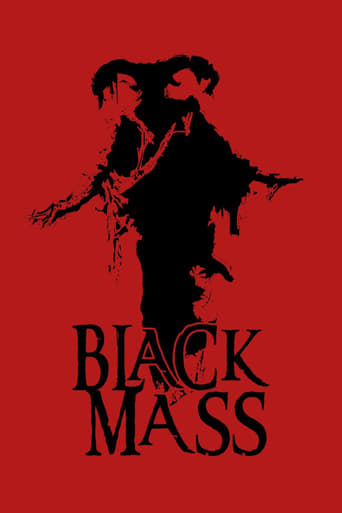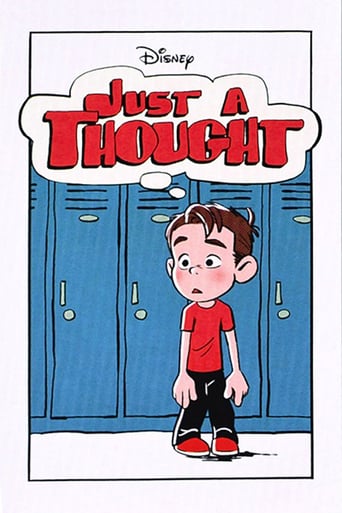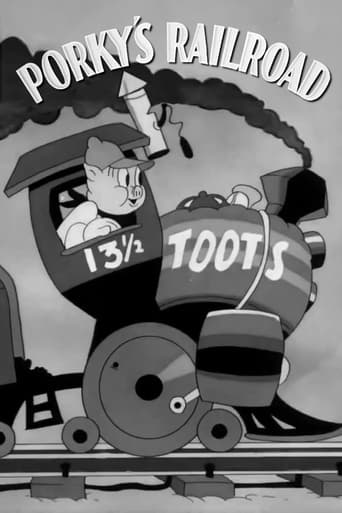
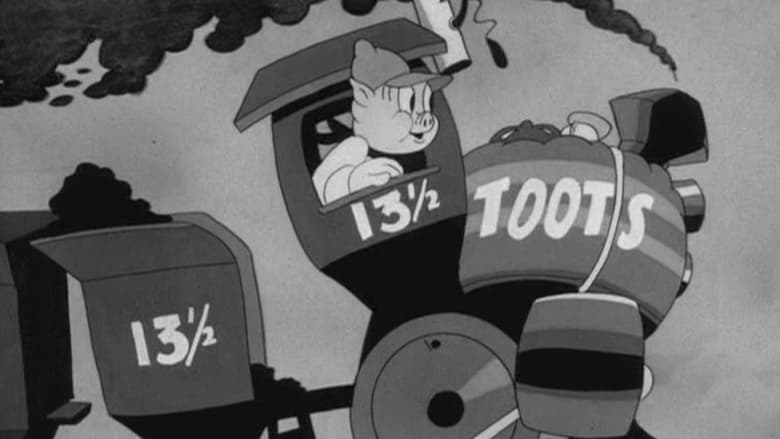
Porky's Railroad (1937)
Porky is the engineer on the most pathetic train in the fleet. After some routine episodes (using pepper to get the engine to sneeze itself up a hill, chasing a cow off the tracks, only to discover too late that it's been replaced by a very angry bull), Porky gets word that he's going to be replaced by the new streamlined Silver Fish. He insults it under his breath, but the Silver Fish engineer hears and challenges him to a race. The angry bull catapults Porky to victory.
Watch Trailer
Cast
Similar titles
Reviews
In truth, there is barely enough story here to make a film.
This story has more twists and turns than a second-rate soap opera.
It's funny, it's tense, it features two great performances from two actors and the director expertly creates a web of odd tension where you actually don't know what is happening for the majority of the run time.
It's simply great fun, a winsome film and an occasionally over-the-top luxury fantasy that never flags.
Porky's Railroad (1937) ** 1/2 (out of 4)Decent, if nothing overly special, short has Porky Pig traveling around in his 15th Century train when a newer, faster 30th Century challenges him to a race.PORKY'S RAILROAD is pretty slim on story and I'd also argue that there really aren't too many laughs either. The short manages to be slightly entertaining thanks to the very good animation, which is certainly the highlight. I'd say that Porky is in fine shape and manages to hold your attention as he talks to his train and keeps trying to make it do better than it actually should.
The work of Frank Tashlin is always worth a look. Porky's Railroad is one of his weaker Porky cartoons, and a disappointment after the brilliant Porky the Fireman. The weakest asset with Porky's Railroad was the story, which is agreed rather feeble, structurally it's thin and the pace is lacking in crispness. Porky's Railroad does have a few inspired moments, but the gags mostly are forgettable and not all that funny marred by their predictability and dull timing. Tashlin was an underrated animation director who a vast majority of the time showed signs of masterful technical and directorial brilliance, you can see this in cartoons like Plane Daffy, there is evidence of this brilliance but the pace and gags don't really serve him all that well. The slow motion shot at the start is an oddity, unusual for Tashlin. However, the animation is very good on the most part, the camera angles generally do impress and there's little wrong with how everything's drawn and shaded. The music sounds beautiful and is very characterful, as to expect the synchronisation from sound to visual works very well, in Porky's Railroad the best example is to the train starting up and accelerating very quickly. As well as the shocking and poignant ending, that is also the best gag/highlight of the cartoon, though the jumping off the drawbridge was also quite nice. Porky is a good lead character, not the strongest one but a credible one, while Mel Blanc's characterisations are without fault. Billy Bletcher gives nice support too. All in all, decent but could have been better. 6/10 Bethany Cox
This is a very good cartoon that I intend to watch many times more in the future, but for now I will publish these modest comments based on my experience of having seen it only once. What strikes me as shocking about 'Porky's Railroad' is its absolutely -- even brutally, I should say -- honest depiction of the soul of man under capitalism -- to paraphrase the title of that famous book by Oscar Wilde -- which I unfortunately have not read yet. The first shot establishes the state-of-the-art in trains -- one that would look modern even by today's standards. Then, the film switches to Porky's obsolete -- and barely functional -- model. It is interesting then how the film establishes Porky's character as sentimentally attached to his old train, but not anti-technology at all: for him, machines have precedence over animals. The race that ensues is the necessary conflict that precedes the shocking -- and of an unbridled cynicism -- ending that carries to the last consequences the truism that sentimentality has no place in a technological capitalist society -- Porky wins the race but is not allowed to keep his train; instead he is promoted to machinist of the new one, and is soon bursting with joy. Obsolescence happens to trains as well as to people -- the old machinist goes to the 'garbage can' just as Porky's old train.
Clearly this cartoon has been around a long time, produced prior to my birth. However in about 1997 I had an occasion to be viewing this piece in the company of several small children. In the midst of this viewing, I caught what I detected to be Morse code signals. I wasn't sure at first but as I carefully listened to this piece (on VHS tape), the more I was convinced that I was right. The problem was complicated because the Morse was somewhat hidden beneath a rendering of "California Here I Come." Nevertheless, taking time to be sure, I found that the real message was different from the message being show to those in a theater watching the cartoon. In the picture Porky, in a race against a new and modern train, was alerted by telegraph that a cow was on the tracks ahead. To convey this message to the film watching audience, a hand came to the screen taping a message on a telegraph key. There was this Morse code sound and the audience would have assumed the sound was a representation of a message to Porky that he should be careful. However the real message of the code was an invitation to contact the producer in Hollywood and receive a picture of Porky. At this late date it is fair to say that there is no way to know if anyone ever did this. In the days when this cartoon was being viewed by the theater going public, few in the audience would have had the opportunity to get a copy of this and go over it many times to weed out the truth of the hidden message. This didn't really become easily available to the general public until the development of VHS tapes. I view this as a simple little joke by the cartoon producers who probably had a long laugh in their offices for many years. A similar Morse code message can be found in The Lone Stranger and Porky produced in '39. Were it not for my skill at Morse, acquired as a condition of being a ham radio operator, this hidden message would probably never have come to my attention. I have no reason to think I was the first to note this message. Nevertheless it was an interesting experience to discover something few others would have noticed.
